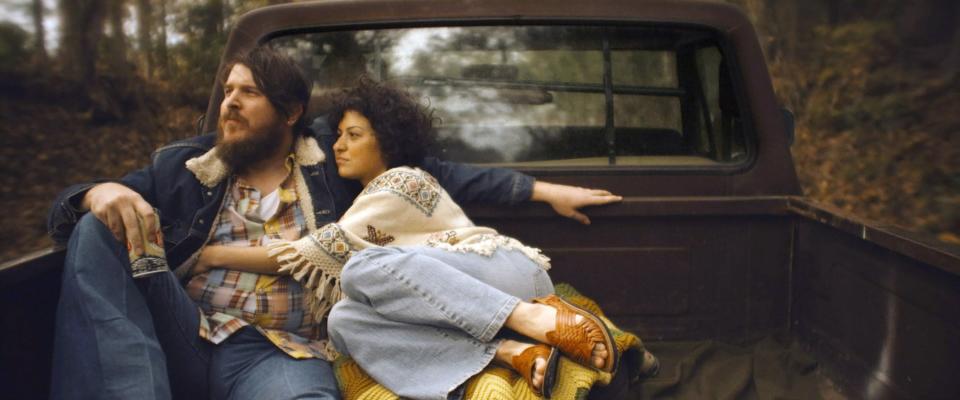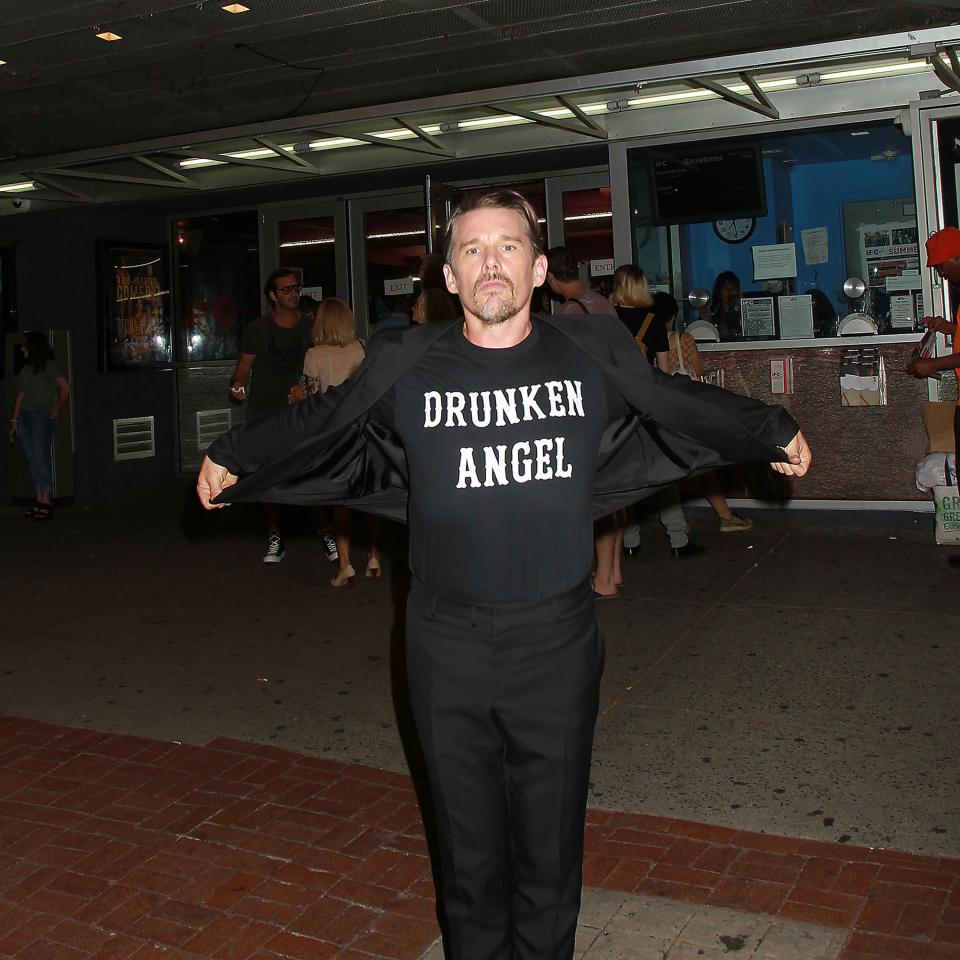Ethan Hawke on Blaze , Outlaw Music, and the Dangers of Living Creatively
Ethan Hawke, the impressively multi-hyphenate award-winning actor-screenwriter-director-novelist, may have just found your next favorite singer for you. His virtuosic new film, Blaze—to call it a biopic is to diminish it, but to avoid calling it that just complicates things—which premiered last month, is centered around the life and legend of the late Blaze Foley, and Foley’s song “Clay Pigeons” takes center stage early on. Dial it up now, in fact; it’s a great litmus test: If you like the song, you’ll probably like the film; if you don’t, you likely won’t. Foley—it’s not a spoiler to note that he died a complicated and tragic death in 1989 (the film tells you that right up top)—received little attention and only insiders’ acclaim during his rambling, troubadour life, which is something Hawke’s film aims to correct. We rang him up to learn a bit more about the man, the legend, the film, and the director.
First off: Your film blew my mind—I’m deep in the wheelhouse of the whole Texas alt-outlaw singer-songwriter thing, or whatever you might call it, from Townes Van Zandt and Jimmie Dale Gilmore and Butch Hancock and Joe Ely and Terry Allen to, obviously, better-known people like Willie and Waylon. But why didn’t I know about Blaze Foley? And why didn’t any of my friends tell me about him?
I have a big grin on my face right now listening to you ask that question, because it’s part of the reason I made this movie. I love all those guys, too, and I really didn’t discover Blaze myself until about 2006, when John Prine covered his song “Clay Pigeons.” Then I told somebody that that was my favorite John Prine song, and they’re like, “That’s a guy named Blaze Foley.” And I said, “Who’s that?” And he said, “He’s the same guy who wrote ‘If I Can Only Fly,’ ” that Willie [Nelson] and Merle [Haggard] covered and that Merle said was the best country song of the last 20 years. And then I find out he’s the guy Lucinda [Williams] wrote “Drunken Angel” about. And my curiosity just grew, and I started finding out who he is and falling in love with him. And when you hear his story—I got told four different versions of his death. It started sounding like Robert Johnson or something—some strange, mythic type of person. But the legend just grew in my brain. And then when I found out that he fell in love with a treehouse and that’s where he learned to play guitar and start writing, I was like, “Okay, this is a movie.”
You’ve described this film as “a country and western opera.” How so?
I use Blaze’s own music to tell the story. He writes so personally that I could kind of piece together the story by the songs, kind of like if you were making a musical. But the advantage that I had was that I had all this great music that nobody had heard before. If you’re doing the Johnny Cash story, or the Chet Baker story, or whatever it is, the music’s already famous; it’s kind of like a greatest hits album or something—it’s good, but it lacks a certain creativity, right? I got to take this whole canon—60 or 70 great songs—and piece them together and weave together a plot using his own music.
The film is really interesting because it shows this kind of duality of how Blaze dealt with his creative talents. There’s this extremely sweet side of it in his innocence and his purity, in a way—his devotion to the song, and to his muse—but the other side of that coin is a kind of self-indulgence, a narcissism, which I guess has something to do with that purity also: the narcissism of abandoning everything to chase your muse. Was that a conscious decision to set that up, or is that just the way Blaze rolled?
You know what? You’re the first person to ever articulate that my secret to the movie—for myself—is that it’s not really about Blaze Foley to me; it’s using his story to discuss the kind of two wells that I feel like creativity can come from: One is nature, absolutely effortless, the joy of creativity, human expression, doing it for absolutely no reason other than that you can’t not do it, you know? And there’s this other well of self-importance, self-aggrandizement—which also, of course, is insecurity and self-loathing. It’s two sides of the same coin; it’s a different well. It’s maybe I’ll be amazing. Maybe I’ll be immortal. And you set yourself on fire, basically. And both of those wells produce amazing art. That’s the mystery. Like when I was young, I felt like, “This is the right way—it’s about being a good person.” Funnily enough, that’s not the only way you can make great art, sadly. So it’s always a great mystery. Combine that with the fact that we’re also talking about a person who today you’d probably call bipolar, right? There’s something of a dualistic thing happening in the movie: There’s the love affair with Sybil that represents one well—healthy, masculine-feminine, unity, you know. It’s kind of Whitman-esque and Walden Pond–ish. And then another well is represented by the genius of Townes Van Zandt, which has drawn him like a moth to a flame, egging him on and daring him.
Yeah—add alcohol and . . .
And a few other things, probably.

MCDBLAZ EC011
The film is based on the memoir of Blaze’s former partner and muse, Sybil Rosen. Would it have been possible to make it without this book? And is the source material entirely from this book or do you add to it and amend it?
I had the idea of the movie and started doing research on it and I came across this book and I was blown away by it—the quality of the writing, the quality of the insight. But also because of Sybil’s relationship with time. The memoir is really kind of about being in love with a ghost, being in love with a real person, and how these songs can be kind of like time portals. The movie would have been absolutely impossible without Sybil. It just never would have happened. But we also did our own research about the other aspects of Blaze’s life that Sybil wasn’t around for. We all worked on it together.
How did you end up casting a relatively unknown singer, Ben Dickey, to play Blaze? Or is he not unknown and I just haven’t done my homework?
[Laughing] No, no, no—the answer is in the question. I’ve been friends with Ben for 15 years, watching him struggle in the music industry. And I started seeing the parallels between his life and Blaze’s life. I’d see Ben, whose love of music is very powerful and intense, pushing himself to write great music, and he was getting met with a shit ton of indifference, you know? And I said to him one night, “Would you ever be interested in playing Blaze Foley?” And I think he thought Blaze would be a small character who maybe just played a few songs or something. And at that time, maybe that’s all I thought it would be . . . but as the project grew, I got Ben taking acting classes, and we started working together. He’s an incredible artist, musically, already—all I really had to do was shift the dial a bit toward acting and give him the opportunity to play a part that meant so much to him. Blaze—along with people like Mississippi John Hurt and Lightnin’ Hopkins and Townes—is a hero to Ben, and the opportunity to dive deep inside these songs was really exciting to him. And then he fell in love with Sybil and the whole thing just took off.
And did rounding out the cast with a bunch of relatively unknown musicians give you pause, or cause you an undue amount of stress? They make it work so well—but honestly, I’d have thought that the odds of this succeeding were pretty small.
I’m really proud of it, but yeah—it kept me up at night. But part of the DNA of the project was to make a music movie that might fail at some things but wouldn’t fail at being authentic to the music. All the music is recorded live. You know, I got [Kris] Kristofferson in there, the patron saint of actor-singers or actor-artists; I got Alynda Segarra from Hurray for the Riff Raff to play Blaze’s sister. I invited Gurf Morlix—who’s an amazing singer-songwriter and, along with Townes, was one of Blaze’s best friends—to be on set all the time, and he worked with Ben on exactly how Blaze picked that song and exactly what the phrasing and the pacing was of each songs. ’Cause our idea wasn’t to fix the songs—we wanted to defend the songs, play them the way that Blaze would have played them.
And having Charlie Sexton play Townes—he’s just incredible in the movie. I met Charlie when I was doing Boyhood—and we hung out a bunch, because that movie took years to make, so we got to know each other. And he plays with [Bob] Dylan all the time, and I’d go see him a couple times a year and talk to him—and he’s always studying acting. He just loves acting. I mean, when you meet a Texan who’s been playing rock ’n’ roll who likes talking about Daniel Day-Lewis, you just go, Okay—interesting. And Charlie knew Townes. He knew Blaze. He was a little kid in Austin and saw them and hung around with them. He was a vital part of bringing in the right feeling and the right energy and making sure there was no lying in this film.
The idea was just to run a little acting workshop for these incredibly talented musicians and just see what happens. And they all came through in incredibly huge ways.
Read More Culture Stories:
The 54 Best Romantic Comedies of All Time—Read More
Dating Someone Older Isn’t Always a Bad Idea—Read More
Azealia Banks, Grimes, and Elon Musk: What’s Going On Here?—Read More
17 Stars Who Went to Extreme Lengths for Movie Roles—Read More
Henry Golding, Crazy Rich Asians Star: Everything You Need to Know—Read More


